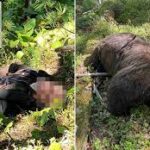Orphaned baby elephant raised by human ‘mom’ dies in Malawi
Published on November 14, 2012 at 2:10 PM by FACE OF MALAWI
A baby elephant raised by a human mother for eight months after being separated from his herd in northern Malawi, died Tuesday from colic and acute diarrhea.
I finally met Moses (so called because he was rescued from a river in Vwaza National Park in February) in October after speaking with his human mother Jenny Webb since May.
Rescued at one week of age by a park ranger and an Italian tourist, Moses faced a 10 per cent chance of surviving one month. Calls from the rescue team went out all around Malawi but no agency was able to care for the baby elephant.
Malawi’s Department of Parks and Wildlife says, “do the best they can do but in a really poor country funds are limited and elephants are unfortunately, rather expensive creatures to take care of.”
Webb has rescued many animals (to date she’s raised and released 25 Vervet monkeys) and always takes note what to feed babies of all species.
“Yes, I’m the crazy lady who’s an adoptive mom of an elephant,” she said. When she received a call asking what to feed the elephant, it was clear there wasn’t anyone in the country who could take care of it. So she jumped in her car, drove five hours and brought him home to her nine-acre farm outside of Lilongwe.
Webb knew the risks. “With very tiny elephants, the odds of them surviving the first month are rather slim,” she said.
“Baby elephants are susceptible to pneumonia and diarrhea. It’s a bit of a risk for people to take on an elephant. You get all the bad publicity if the elephant doesn’t survive even though you did everything correctly.”
The biggest risk, according to the Elephant Orphanage Project in Zambia, was emotional bonding. “If we could make sure he wasn’t traumatized, and develop close emotional bonds. . . that would be the biggest battle,” said Webb
As I talked to Webb in her house, Moses shuffled over to her. She stroked his trunk over her shoulder and leaned back into his hug.
When Moses decided I was a friend, he spent 30 minutes running his trunk over most of my body. He started at my sandals, rubbing around the buckles, strayed up my leg, felt my fingers and then rubbed my wrist and circled my watch, and then spent minutes just moving his trunk over my face and through my hair.
Webb slept with Moses every night. She laid a mattress on the floor of her home where Moses would curl up with his head on the pillow. Webb had to face him placing one hand underneath his head, and the other on top.
“If I turned around in the night, Moses would put his trunk over my shoulder and turn me back to face him.”
One night Moses started exploring Jenny’s face. “He’d touch my eyes with his trunk, and then his eyes. Touch my ears, then his ears. Then my mouth, then his mouth. But then he circled my nose again and again and again.”
“My husband, Laurie, is very understanding!” she said with a laugh.
Moses needed to be fed every two to three hours. He drank 24 litres a day of a special formula containing 15 ingredients that Webb fed him. His expenses mounted to the equivalent of $12,000 a month.
Webb started the non-profit Jumbo Foundation at her farm so that other large animals would have sanctuary. She’s currently building a barn.
Moses became an “elephant ambassador” said Webb, “and opened up hearts and minds to people all over the world.”
In August, Moses had a hernia operation and for two weeks teetered between life and death. Webb returned home after hearing that Moses was dying. She started an intravenous drip and he rallied.
Last Friday, when Webb realized Moses’ diarrhea was serious, she started him on drips until his death on Monday night.
Moses didn’t die scared and alone in a river like he would have eight months ago, but in Webb’s arms.
“In his final minutes he was grunting softly to me in the way that he used to do at night,” Webb wrote in an email Tuesday. “He then wrapped his trunk around my arm and breathed his final breath.”


